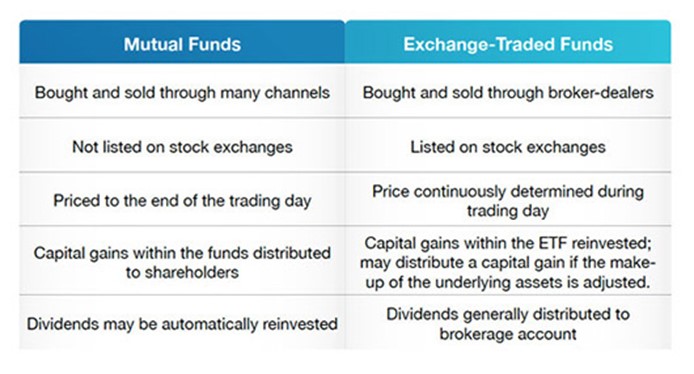The growth of exchange-traded funds (ETFs) has been explosive. In 2002, there were only 102; by 2020, there were over 7,000 investing in a wide range of stocks, bonds, and other securities and instruments.1
At first glance, ETFs have a lot in common with mutual funds. Both offer shares in a pool of investments designed to pursue a specific investment goal. And both manage costs and may offer some degree of diversification, depending on their investment objective. Diversification is an approach to help manage investment risk. It does not eliminate the risk of loss if security prices decline.
Structural Differences
Mutual funds accumulate a pool of money that is then invested to pursue the objectives stated in the fund’s prospectus. The resulting collection of stocks, bonds, and other securities is professionally managed by an investment company.
ETFs work in reverse. An investment company creates a new company, into which it moves a block of shares to pursue a specific investment objective. For example, an investment company may move a block of shares to track performance of the Standard & Poor’s 500. The investment company then sells shares in this new company.2 ETFs trade like stocks and are listed on stock exchanges and sold by broker-dealers.
Mutual funds, on the other hand, are not listed on stock exchanges and can be bought and sold through a variety of other channels — including financial professionals, brokerage firms, and directly from fund companies.
The price of an ETF is determined continuously throughout the day. It fluctuates based on investor interest in the security, and may trade at a “premium” or a “discount” to the underlying assets that comprise the ETF. Most mutual funds are priced at the end of the trading day. So, no matter when you buy a share during the trading day, its price will be determined when most U.S. stock exchanges typically close.
Tax Differences
There are tax differences, as well. Since most mutual funds are allowed to trade securities, the fund may incur a capital gain or loss and generate dividend or interest income for its shareholders. With an ETF, you may only owe taxes on any capital gains when you sell the security. (An ETF also may distribute a capital gain if the makeup of the underlying assets is adjusted).3
Determining whether an ETF or a mutual fund is appropriate for your portfolio may require an in-depth knowledge of how both investments operate. In fact, you may benefit from including both investment tools in your portfolio.
Amounts in mutual funds and ETFs are subject to fluctuation in value and market risk. Shares, when redeemed, may be worth more or less than their original cost.
Mutual funds and exchange-traded funds are sold only by prospectus. Please consider the charges, risks, expenses, and investment objectives carefully before investing. A prospectus containing this and other information about the investment company can be obtained from your financial professional. Read it carefully before you invest or send money.
At a Glance
Mutual funds and exchange-traded funds have similarities — and many differences. The chart below gives a quick rundown.

Sources:
1. Investopedia.com, 2021
2. The Standard & Poor’s 500 Composite Index is an unmanaged index that is generally considered representative of the U.S. stock market. Index performance is not indicative of the past performance of a particular investment. Past performance does not guarantee future results. Individuals cannot invest directly in an index.
3. Investopedia.com, 2020
Please remember that different types of investments involve varying degrees of risk, and there can be no assurance that the future performance of any specific investment, investment strategy, or product made reference to directly or indirectly in this content, will be profitable, equal any corresponding indicated historical performance level(s), or be suitable for you or your portfolio. Due to various factors, including changing market conditions, the content may no longer be reflective of current opinions or positions. Moreover, you should not assume that any discussion or information contained in this newsletter (article) serves as the receipt of, or as a substitute for, personalized investment advice from Allos Investment Advisors®, LLC.
The content of this letter does not constitute a tax or legal opinion. Always consult with a competent professional service provider for advice on tax or legal matters specific to your situation. To the extent that a reader has any questions regarding the applicability of any specific issue discussed in this content, he/she is encouraged to consult with the professional advisor of his/her choosing.
Published for the blog on April 4, 2022 by Allos Investment Advisors®, LLC.







